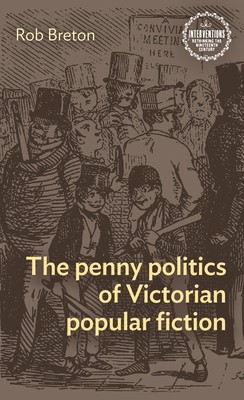
- We will send in 10–14 business days.
- Author: Rob Breton
- Publisher: Manchester University Press
- ISBN-10: 1526156385
- ISBN-13: 9781526156389
- Format: 14 x 21.6 x 1.4 cm, hardcover
- Language: English
- SAVE -10% with code: EXTRA
Reviews
Description
Penny politics examines the way Victorian popular literature from the 1830s and 1840s attempted to appeal to working-class audiences by including overtures to radical and at times explicitly Chartist politics.
The book challenges the approach to 'low life' or crime literature that sees it as merely rejecting polite, respectable culture. Rather, this book argues that the authors of Jack Sheppard and Sweeney Todd, for example, sought to augment the size of their audiences by making entertainment out of the languages of class and class conflict popular in the radical or Chartist press. Cheap, popular literature, however sporadically and casually, looked to the popularity of Chartism and its republican energies to help define its place in the market. Penny politics reads this fiction's representations of workplace grievances, martyrs and underdogs, and dissonant crowds in search of a purpose as radical acts in themselves, feeding public resentment and making the case for extreme forms of political remediation. Though the image of working-class agency and fantasy of social vengeance that popular literature would sell for cheap was not always explicitly lending support to the radical politics of the day, Chartism, early Victorian popular literature made social anger available to its audiences - potentially the same audience reading the Chartist papers - so as they might do whatever they wanted with it.
With its grounding in Chartist studies and theories of radical culture, Penny politics offers an essential re-reading of Victorian popular fiction.
EXTRA 10 % discount with code: EXTRA
The promotion ends in 17d.22:39:31
The discount code is valid when purchasing from 10 €. Discounts do not stack.
- Author: Rob Breton
- Publisher: Manchester University Press
- ISBN-10: 1526156385
- ISBN-13: 9781526156389
- Format: 14 x 21.6 x 1.4 cm, hardcover
- Language: English English
Penny politics examines the way Victorian popular literature from the 1830s and 1840s attempted to appeal to working-class audiences by including overtures to radical and at times explicitly Chartist politics.
The book challenges the approach to 'low life' or crime literature that sees it as merely rejecting polite, respectable culture. Rather, this book argues that the authors of Jack Sheppard and Sweeney Todd, for example, sought to augment the size of their audiences by making entertainment out of the languages of class and class conflict popular in the radical or Chartist press. Cheap, popular literature, however sporadically and casually, looked to the popularity of Chartism and its republican energies to help define its place in the market. Penny politics reads this fiction's representations of workplace grievances, martyrs and underdogs, and dissonant crowds in search of a purpose as radical acts in themselves, feeding public resentment and making the case for extreme forms of political remediation. Though the image of working-class agency and fantasy of social vengeance that popular literature would sell for cheap was not always explicitly lending support to the radical politics of the day, Chartism, early Victorian popular literature made social anger available to its audiences - potentially the same audience reading the Chartist papers - so as they might do whatever they wanted with it.
With its grounding in Chartist studies and theories of radical culture, Penny politics offers an essential re-reading of Victorian popular fiction.


Reviews